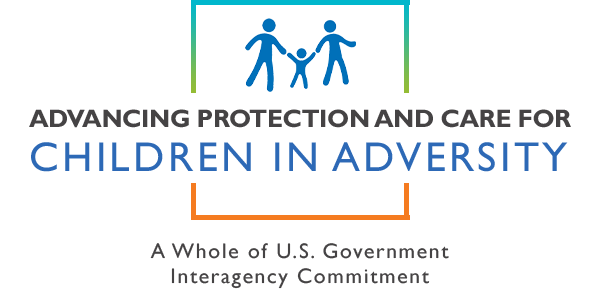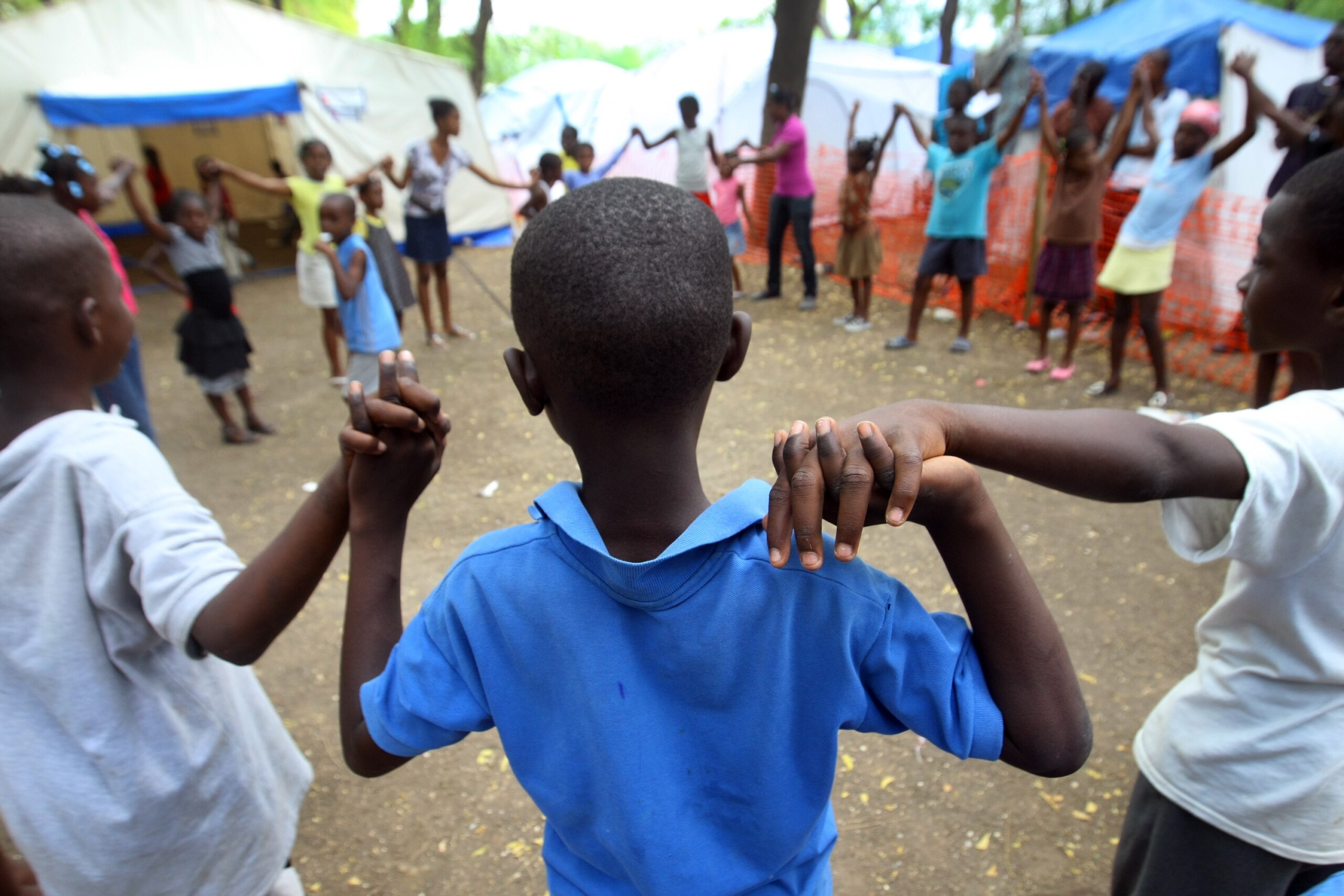APCCA Editorial
DIPLOMACY AND DEVELOPMENT: PARTNERING TO PROTECT CHILDREN ON A GLOBAL SCALE
Written by: Michelle Bernier-Toth

Credit: AFP/ United Nations Photos
The tools and resources at our disposal are different–but the focus on the protection of vulnerable children is the same.
The Peterson family first met 12-year-old Natasha when she came to their Florida home to participate in a summer hosting program for Ukrainian orphans. Soon after her six-week visit, they decided to adopt her and had just finalized the adoption in the Ukrainian courts and were preparing to bring her home when the Russian invasion began. Panicked about Natasha’s safety but unable to reach her, the Petersons coordinated with their adoption service provider, the Department of State, and humanitarian aid organizations on the ground to arrange Natasha’s safe passage across the border into Poland.
There, the U.S. Embassy in Warsaw facilitated further coordination with the Ukrainian government to verify her identity, final adoption, and eligibility to immigrate to the United States. Natasha is safely home with her new family, who are ensuring she receives the love and care needed to overcome her traumatic experiences during her evacuation from Ukraine.
While Natasha’s story may sound unique, it is the type of challenge my colleagues and I face every day.
As the Special Advisor for Children’s Issues in the Department of State’s Bureau of Consular Affairs, I have the privilege of focusing on two critical issues: International Parental Child Abduction, and Intercountry Adoption. I work closely with the Office of Children’s Issues (CA/OCS/CI), which serves as the U.S. Central Authority for the 1980 Hague Convention on the Civil Aspects of Child Abduction, as well as the 1993 Hague Convention on the Protection of Children and Cooperation in Respect of Intercountry Adoption. Together, we develop strategies to encourage countries’ accession to both conventions and implement them fully and effectively. CA/OCS/CI also handles parental abductions and adoption policies in countries that have not yet joined the Conventions, or with which the U.S. has not yet partnered. The challenges inherent in each issue are different, the stakeholders are different, and the tools and resources at our disposal are different—but the focus on the protection of vulnerable children is the same. And for both issues, diplomacy is a critical aspect of promoting that protection.
WAR CHANGES ALL THE RULES
Our goal is to ensure that intercountry adoptions are carried out in an ethical, transparent manner that protects the best interest of a child.
Russia’s horrific and unjustified invasion of Ukraine prompted a surge in inquiries from U.S. citizens seeking to adopt children from institutions, and especially those children known to U.S. families through prior hosting programs. It is a universally recognized principle, however, that times of crisis—be they man-made or natural disasters—are not the time to initiate adoptions, either domestic or intercountry. It can be extremely difficult during crises to determine whether children who appear to be orphans are truly eligible for adoption and immigration under U.S. laws. Children may be temporarily separated from their family, and their parents or other caregivers may be looking for them. Families may make the difficult choice to send children on their own or in the care of non-family members in order to achieve their safety. When a child’s parents have died, other relatives may be willing and able to care for them.
Yet at the time of the invasion, there were children who had recently been adopted by U.S. parents and were ready to apply for their immigrant visas and travel to the United States. CA/OCS/CI had already been in close contact with the U.S. adoption service providers supporting the families and knew where each child was located and their specific circumstances. Working tirelessly over the following weeks, CA/OCS/CI officers coordinated with the adoption agencies, Ukrainian authorities, and dedicated non-governmental organizations and individuals to develop safe travel plans for each child so that they could be reunited with their new parents. As the crisis in Ukraine stretched out, CA/OCS/CI maintained almost daily communications with Ukraine’s Ministry of Social Policy and National Social Services on behalf of U.S. prospective adoptive parents worried about the safety and welfare of the children they were in the process of adopting. This steady diplomacy ultimately resulted in Ukraine’s agreement that—subject to security conditions on the ground— those cases where a child had been matched to prospective parents prior to the invasion could move forward in the courts, allowing parents to finalize adoptions and bring their children to the United States. In CA/OCS/CI, each of these cases is a cause for celebration.
In all of our diplomatic efforts with other countries, our goal is to ensure that intercountry adoptions are carried out in an ethical, transparent manner that protects the best interests of a child. Intercountry adoption should be part of a country’s child welfare program, and only an option when other paths to a permanent, loving family are not available in country. This is where the world of CA/OCS/CI intersects with the work being done by USAID, Peace Corps, CDC, and other APCCA partners to strengthen a country’s child welfare system, support families and communities, and provide children with nurturing, protective families in which to grow and thrive. As our partners bring development assistance and expertise to the table, we work with host governments to take care of those children who will otherwise not find permanency–especially older children, sibling groups, and children with special needs. As history has shown, U.S. families are always ready to open their hearts and homes to children for whom other paths to permanency are not open.
UNRAVELING THE TRAUMA OF PARENTAL ABDUCTION
For many years–and still in many countries–international parental child abduction was not viewed as having a negative impact on children, especially if the taking parent was the child’s mother. The lived experience of adults abducted as children, however, has confirmed what numerous studies revealed–that international parental child abduction inflicts trauma on its child victims. For that reason, the Hague Abduction Convention was developed to create a bridge between legal systems and return parentally abducted children to their country of habitual residence, where matters of custody can be decided by a competent court in the best interests of the child–not the unilateral actions of a taking parent. The principles of the Convention are simple, but its implementation is often fraught with challenges as countries seek to meet their treaty obligations within the limitations of their legal systems. This is where diplomacy comes into play, and where my CA/OCS/CI colleagues and I spend a great deal of time and attention.
We actively encourage countries that have not joined the Hague Abduction Convention to take the necessary steps toward accession and become trusted, effective treaty partners. We work bilaterally and multilaterally to raise awareness of the Convention and its implementation through diplomatic engagement, training, and outreach. During the past few months, CI officers and I have traveled extensively to meet with foreign officials, participate in workshops and seminars, and consult with our counterparts in other countries, who are equally committed to protecting vulnerable children.
Our work to address and, whenever possible, prevent international parental child abduction benefits from the work of our APCCA partner agencies as well. Programs focused on rule of law, for example, bolster our efforts to ensure that Hague applications for return are handled promptly by the judiciary, in keeping with the Convention’s requirement that cases be resolved within six weeks. Programs targeting gender-based violence provide support and resources for victims of violence who might otherwise flee with their children to another country.
As our participation in APCCA demonstrates, diplomacy and development go hand in hand to protect vulnerable children. As Special Advisor for Children’s Issues, I enjoy the opportunity to connect my colleagues in CA/OCS/CI with counterparts across the U.S. government who are equally committed to interagency coordination aimed at protecting children around the world. Like Natasha, those children face tremendous obstacles, but their prospects of finding safe, secure homes are vastly improved thanks to those dedicated colleagues.
Michelle Bernier-Toth is the Department of State’s Special Advisor for Children’s Issues. Prior to assuming the role in 2020, she served as the Managing Director for Overseas Citizens Services and has held other positions in that Directorate, including the Office of Children’s Issues and the Office of American Citizens Services and Crisis Management. She joined the Department of State in 1987 as a foreign service officer and converted to civil service in 2003.

